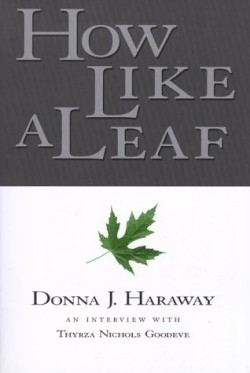How Like a Leaf
An Interview with Donna J. Haraway
By the late 20th Century, we are all chimeras, mythic hybrids of machine and organism, in short, cyborgs.
Arcing from a 1983 version of the classic essay “A Cyborg Manifesto,” flow the words of Haraway, a renaissance matron of philosophy, who has simultaneously generated the spark of enlightenment and singe of skepticism within her readership. Interviewer Goodeve in How Like a Leaf, extends both critical and allied readers a rare opportunity—a vicarious conversation with Haraway, the woman who often may seem obscured by her coils of words and her nests of theory.
A Professor in the History of Consciousness Department at the University of California, Santa Cruz, Haraway enjoys international acclaim as an academic aggregate of feminism, science, philosophy and humanity. She routinely explores the relationships of nature, culture and society, while crossing the boundaries of diverse fields of study in the process. Filtered through an unfailing devotion to biology, much of Haraways passion is captured in the intricate veils of metaphor within which her ideology is woven… “Biochemistry and language just don’t feel that different to me.” Within the science of life, Haraway finds metaphors for life.
The clever argument concerning the micro-organism Mixotricha paradoxa, for example, from the foreword to The Cyborg Handbook reveals one of Haraway’s such metaphorical assertions. A single celled organism that is comprised of five symbiotic entities, this diminutive creature amplifies the greater societal questions of identity, individuality and interdependence. Haraday explains this, and other specific theories which Goodeve has culled from Haraday’s celebrated works, including her famed cyborg studies, which identify all who have assimilated technology—from e-mail to artificial limbs—as hybrids of machine and flesh. Primate studies, genetics and a critique of psychoanalysis are additional topics discussed.
Transcending the academic edge of the interview, and grounding it with the warmth of biographical departures, the author guides the discussion to reveal Haraway’s belief on what has shaped her ideology. Tracing her life details, readers follow the often tragically beautiful path that has brought this great mind to the forefront of contemporary thought.
How Like a Leaf offers its reader an inviting visit with Haraway, which evolves as a balanced blend of academic discourse and informal banter housed in a deceivingly slender book, as compared to the volumes of related thought it conjures. As cyborgs, our neurons resonate the electric hum of her words—their prophetic implications racing through terminals, past each glowing plexus with the thrill of transformation, and the exactness of circuitry. (December, 1999)
Reviewed by
Karen Wyckoff
Disclosure: This article is not an endorsement, but a review. The publisher of this book provided free copies of the book to have their book reviewed by a professional reviewer. No fee was paid by the publisher for this review. Foreword Reviews only recommends books that we love. Foreword Magazine, Inc. is disclosing this in accordance with the Federal Trade Commission’s 16 CFR, Part 255.

